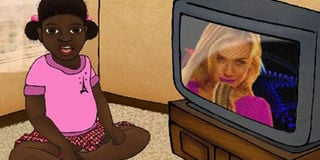Animated short film ‘Yellow Fever’ powerfully explores media-created beauty ideals

Screen grab of the film "Yellow Fever" where Ng’endo Mukii’s niece is watching Western ideals of beauty on TV. PHOTO| FILE
What you need to know:
People heavily criticise Vera Sidika, yet, she is only a product of our society that values women for very specific characteristics.
Ng’endo Mukii ( pictured below) was working on her dissertation at the Royal College of Art in London, where she was pursuing a Master of Arts in Animation when the idea for her award-winning short film Yellow Fever was born.
“I was researching on the way “indigenous” people have been presented in the media over the years. I began to address modern media and the way it might influence our self-image in Kenya.
This is when I realised that there seems to be a bias towards women of particular skin tones and hairstyles within Kenyan media, which as a result, was causing women to strive for very specific ideals of beauty,” she says.

Ng’endo Mukii . PHOTO| COURTESY
Yellow Fever is a powerful short film that explores the effect of media-created ideals on African women and their perception of beauty.
One of the characters in the short animated film is Ng’endo’s five-year-old niece who is sitting in front of the TV watching Western programmes, wishing she was a few shades lighter and says she can change her colour through “magic”
“If I had magic, I would change myself into white skin and white hair.”
The poignant words, told innocently through the mouth of little girl, is telling of our attitude towards the West, their beauty standards and how deeply rooted these are.
HARD TO ATTAIN BEAUTY IDEALS
“Our media is saturated with beauty ideals that are hard to attain, often unhealthy and more often than not, harp towards a classic European/Western concept of beauty; fair skin and long flowing soft silky hair. While growing up, I would come across women who practiced skin bleaching (lightening, brightening), and often had a condescending internal reaction to them.
Now, I realise they are only products of our society. Since our media perpetuates this singular ideal in our girls and women, and we consume this information continuously from a young age.
How can we fault anyone who falls for it, or is susceptible to these ideals (men included), without challenging the people that are creating it?” she asks.
Ng’endo strongly believes that it’s important to have a wholesome alternative to these ideals.
For example, she says, people heavily criticise Vera Sidika, yet, she is only a product of our society that values women for very specific characteristics.
Her film is named in appreciation of Fela Kuti’s song which goes by the same title.
“My tone, though, is very different from his, as he verbally attacks women using bleaching products. The relation between the names, is more to point out that this practice continues to gain traction decades after he released that song,” she explains.
The film got a special mention on Twitter by Beyonce’s sister, Solange Knowles who said the film “just kind of blew” her mind. Solange also featured it on her curatorial art and music platform, St Heron.
Yellow Fever has won quite a number of awards internationally, including:
Black Star Film Festival, USA 2014; Best Experimental Short Film, AfriKamera Film Festival Poland 2014; Best Short Film, Second Afrinolly Short Film Competition, 2014; Voted third place (Documentary Category), This Is England Film Festival, France 2013; Best Animation, Underexposed Film Festival USA 2013; Best Student Film, 49th Chicago International Film Festival, USA 2013
The film also won Silver Hugo for Best Animated Short, 59th Oberhausen International Short Film Festival, Germany 2013; Special Mention in The Prize of the Ecumenical Jury, Africa Magic Viewers’ Choice Awards Nigeria 2013; Best Short Film and 7th Kenya International Film Festival, Nairobi, Kenya 2012 for Best Animation.
Ng’endo is now working on her new fiction short film, Birika (The Teapot). The film considers what sort of world Nairobi would be if all of our emotions had a physical element to them.
She has also been developing a documentary animation called My Normal Kenyan Family.
Useful links: The film can be watched here.





